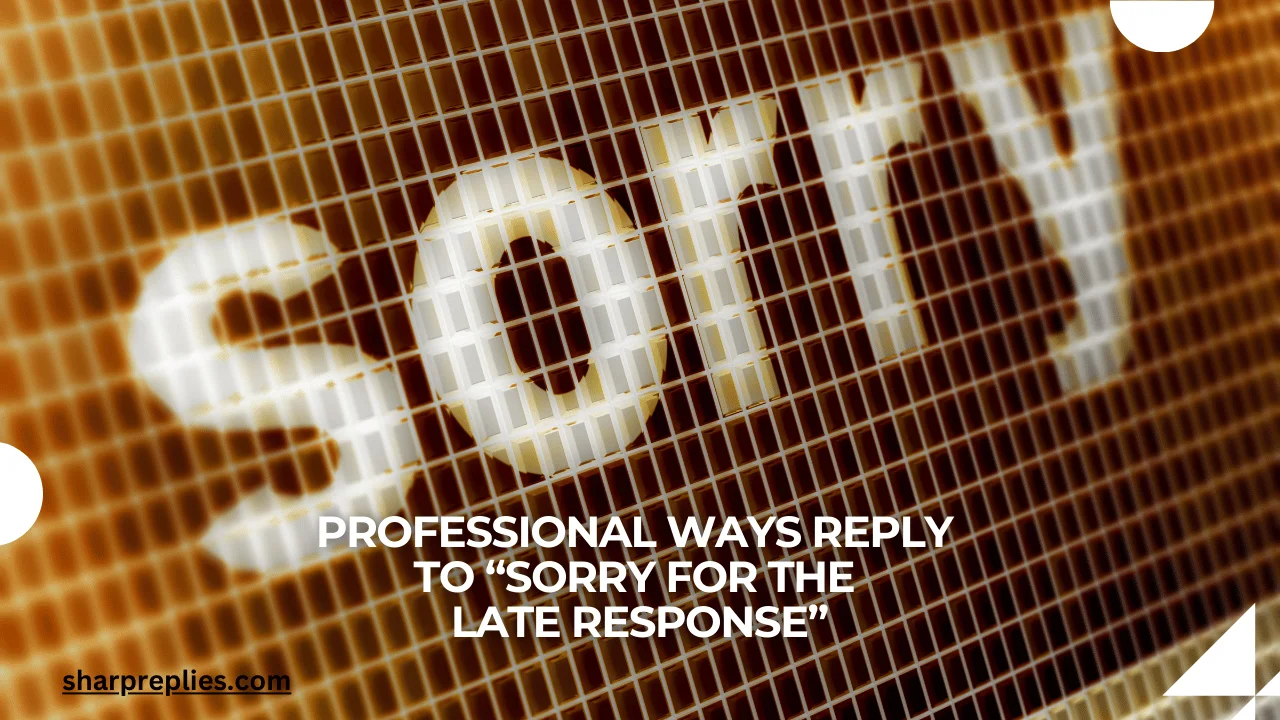In today’s fast-paced, hyper-connected world, a delayed response can sometimes feel like a minor transgression. But whether it’s a result of a packed schedule, unforeseen circumstances, or simply a case of losing track of time, everyone faces the inevitable moment when they need to apologize for responding late.
How do you reply when someone sends you a message saying, “Sorry for the late response”? Do you dismiss the apology, accept it, or return one of your own?
Understanding how to craft a professional reply is more than just etiquette—it’s about maintaining effective communication, preserving relationships, and demonstrating empathy and understanding in a workplace or professional setting.
In this article, we’ll explore the best ways to respond to “sorry for the late response” texts, ensuring that you not only handle these situations with grace but also enhance the quality of your professional interactions.
Whether you’re a manager, colleague, or client, the way you respond to these late messages can leave a lasting impression. Let’s dive into some practical tips for crafting responses that reflect professionalism, empathy, and consideration.
Contents
- 1 Acknowledging and Accepting the Apology
- 2 Offer a Positive or Neutral Follow-Up
- 3 Maintaining Professionalism with Brief, Direct Replies
- 4 Offering Help or Understanding in Special Circumstances
- 5 Knowing When to Politely Redirect or Set Boundaries
- 6 Conclusion:
- 7 FAQ’s
- 7.0.1 What is the best way to reply to “Sorry for the late response” in a work email?
- 7.0.2 Should I apologize for my own delayed response when replying to someone else’s?
- 7.0.3 How can I politely ask for faster replies if someone is consistently late?
- 7.0.4 Should I always acknowledge the delay in the response or just move forward?
- 7.0.5 How do I handle a late reply when it affects project deadlines?
- 7.0.6 Can I simply say “No problem” in a response?
Acknowledging and Accepting the Apology
The first step in replying to someone’s “Sorry for the late response” is to acknowledge the apology graciously.
A professional reply should focus on accepting their apology without making it a bigger deal than necessary. After all, we all experience delays from time to time, and acknowledging the apology helps to keep the conversation moving smoothly.
A simple, “No problem at all, I completely understand!” shows that you are not holding any ill feelings toward the delayed response. This response also communicates empathy, reassuring the person that the delay hasn’t negatively impacted the situation.
In professional settings, being understanding about time constraints, especially when dealing with colleagues or clients, can foster a more relaxed and collaborative environment. By accepting the apology with ease, you create a positive tone that encourages open and non-judgmental communication.
Offer a Positive or Neutral Follow-Up
Once you’ve acknowledged the apology, it’s often helpful to move the conversation forward by offering a neutral or positive follow-up. This helps to keep the focus on the content of the conversation rather than the delay itself.
For instance, if someone says, “Sorry for the late response; I’ve been swamped with meetings,” you could reply with, “I understand completely. I appreciate you getting back to me.
Let’s continue where we left off.” This not only validates their situation but also shifts the conversation back to its purpose. It lets the other person know you’re not dwelling on the delay but are instead focused on achieving the goals at hand.
Offering a positive reply also encourages future communication without creating unnecessary tension or discomfort. By acknowledging their apology while steering the conversation back to its main focus, you demonstrate both professionalism and efficiency.
Maintaining Professionalism with Brief, Direct Replies
Sometimes, a simple and direct response is the best approach, especially in situations where the delay wasn’t significant enough to warrant an in-depth discussion. If a colleague or client sends a late response but the content of their message requires an immediate reply, it’s important to remain professional and keep things moving.
In such cases, a quick and direct response like, “Thank you for the update! I’ll review this and get back to you shortly” can be the perfect way to acknowledge the apology without dwelling on it.
This response conveys efficiency, maintaining a tone of professionalism while not overcomplicating the situation.
In the workplace, time is often of the essence, and staying focused on the task at hand can help both parties avoid distractions. A brief reply assures the other person that you are still engaged and that their late response has not slowed down the workflow.
Offering Help or Understanding in Special Circumstances
In some instances, the delay in response may be due to factors beyond the person’s control, such as a personal emergency, illness, or an especially busy period. In these cases, responding with an offer of support or understanding can strengthen your professional relationship.
For example, if someone apologizes for the delay because they were dealing with an unexpected situation, you might respond with, “I completely understand. I hope everything is okay on your end.
Let me know if there’s anything I can do to help.” This response shows compassion and emphasizes that you are supportive of their situation, fostering a sense of mutual respect.
While it’s important to maintain professionalism, it’s equally essential to show that you care about the person behind the message. Offering help when needed can create a sense of trust and camaraderie in professional settings, ensuring that the relationship remains strong even during challenging times.
Knowing When to Politely Redirect or Set Boundaries

There are times when a delayed response becomes a repeated pattern or even an issue in itself, especially when it starts affecting work timelines or expectations. If this happens, it’s important to address the situation with politeness but also clarity.
If you find that late responses are causing delays in critical workflows or affecting the overall productivity of your team or project, it’s essential to set boundaries or expectations in a respectful way.
For instance, you could respond with something like, “I understand that things can get busy, but moving forward, it would be helpful if we could keep our responses within the agreed timeline to stay on track with the project.”
This reply doesn’t place blame, but it does address the need for more timely communication, ensuring that both parties are on the same page moving forward. It’s important to communicate your needs clearly and constructively, while still maintaining a tone of professionalism and courtesy.
Conclusion:
When it comes to replying to “Sorry for the late response” messages, how you respond speaks volumes about your professionalism, empathy, and communication skills.
Whether you’re accepting the apology graciously, acknowledging the delay while staying focused on the task, or offering understanding in a difficult situation, the key is to ensure that your reply reflects both respect and efficiency.
The way you handle these kinds of situations can either strengthen or strain professional relationships.
By maintaining a calm, empathetic, and solution-oriented approach, you demonstrate your ability to navigate communication challenges with maturity and grace. So, the next time you’re on the receiving end of a late reply, remember these strategies to ensure that you respond in a way that fosters positive, professional interactions.
FAQ’s
What is the best way to reply to “Sorry for the late response” in a work email?
Acknowledge their apology with a simple, “No worries at all! Thanks for getting back to me. Let’s move forward with the project” to keep the conversation professional and focused.
Should I apologize for my own delayed response when replying to someone else’s?
It’s polite to briefly acknowledge any delay on your end, but focus more on the content of the conversation rather than the delay. A simple “Apologies for my delayed response, and thank you for your patience” can work well.
How can I politely ask for faster replies if someone is consistently late?
Politely address the issue by saying, “I understand things get busy, but timely responses would really help keep things on track for this project.”
Should I always acknowledge the delay in the response or just move forward?
Acknowledging the delay is usually a good idea, as it maintains courtesy. However, if the delay was minor and the conversation is urgent, focusing on moving forward is acceptable.
How do I handle a late reply when it affects project deadlines?
When responding, gently remind the person about the importance of meeting deadlines and express that timely communication is crucial for meeting goals.
Can I simply say “No problem” in a response?
Yes, “No problem” is perfectly fine if the delay wasn’t significant or problematic. It keeps the response casual but still professional.








